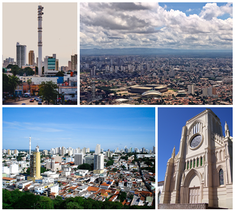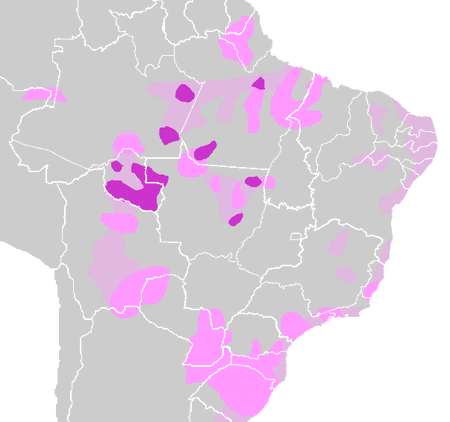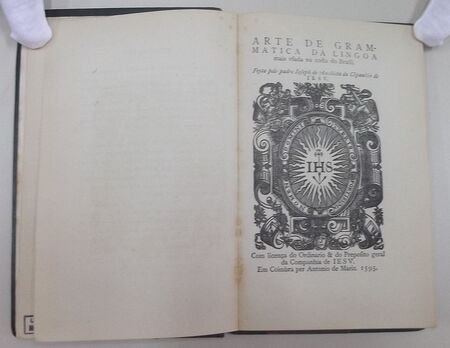
Toponyms of Brazilian Cities #2
Last updated: Friday February 11th, 2022
Report this blog
Taking up from the previous post
As I said on the #1 post of this series, I really like to search for places toponymy because it reveals to us important details about its history. On the last post, I brought examples of municípios (municipalities) named after the Catholic religion: a handful of Brazilian municípios names derived from saints or other signs of the Catholic Apostolic Church (such as the Holy Cross, the Holy Spirit, Mother Mary or Jesus himself). Now, I intend to talk a little about the indigenous names of municipalities.
I must say I can be really prolix sometimes. And it escalates to even higher levels when I am explaining something to someone who does not know a single thing about the subject. So, I will of course be prolix here, as I was on the last post talking about the difference of municípios and cidades and how they were founded. For this subject - municipalities named after indigenous names - I must bring a little of Brazilian history.
There is an old social theory derogatorily called Mito das três raças (Three races myth) [1]. It has first appeared on the XIX century and was common in various literature books and sociological and anthropological works until at least the 1950s. To make a long story short, this theory says that Brazil was created by a mix of three cultures/races (white or Europeans, black or enslaved Africans, and the red or indigenous people), leading to the (wrong) comprehension that Brazil is not a racist country as the U.S. is - or a "Racial Democracy" (some of you may have heard of on the book The Masters and the Slaves, written by Gilberto Freyre in the 1930s). Part of the bourgeoisie (who owned enslaved people and were racist in various degrees) even would say that "Brazil is not racist, because here the black people know their place in society and know we are not against them!". Yeah, of course this was, and still is, nonsensical. Black people were enslaved, treated with violence and given no compensations when slavery was abolished. The indigenous had to choose between being converted to Portuguese/catholic culture or being massacred. But, even so, the Afro-Brazilian culture is still strong (even if racist people demonize it) and the indigenous toponyms are still here (even if they were expelled from most of the country). So, yeah, the "Brazil is not racist" thing is rubbish, but it comes from the fact that at least the country managed to keep parts of these cultures alive. Taking the non-rubbish part of the Three Races Myth - the one that says Brazilian culture is somewhat a mix of European, Afro and indigenous cultures -, we can agree with that. On the last post, I talked about the European factor. Now, it is time to talk about the indigenous
The indigenous toponyms
The Tupi-Guaranian language family is kind of gigantic, and it was once a "Língua geral" (a lingua franca of Portuguese America). The first European colonizers, specially in São Paulo and Amazon forest, learned to talk these languages to trade with the indigenous. This explains why these two regions (the present state of São Paulo [2] and the states located in the Amazon forest) have lots of municipalities with indigenous names.

The Língua Geral Paulista (São Paulo's lingua franca), a Tupian language, was, actually, more common in São Paulo than Portuguese during the XVI to XVIII centuries, until it was only prohibited by Marquês de Pombal in 1755. Even if there was a lot of indigenous slavery, the bandeirantes (group of Europeans who lived in São Paulo and explored the sertões/countryside searching for gold and enslaving indigenous) had indigenous allies (if there were two tribal villages, one of them would ally to the bandeirantes to destroy the other using the superior - in terms of capacity of killing - European weapons). This is a complex part of Brazilian history, that leads many to wrongly say the bandeirantes were not bandits - it is important to say here that they surely were important to explore the countryside inhospitable areas, but they also massacred lots of indigenous villages. Anyway, this proximity resulted in many toponyms being maintained. And this is obvious: the indigenous lived here long before colonizers, so they had their own names for villages, areas and rivers.
I will not separate the names in categories like I did in the last post, because I don't know all the etymologies. It will be easier to just bring some examples and translate it. Some of the translations are dubious, considering they are in Old Tupi, which was almost killed due to the massacres and to the Marquês de Pombal prohibition.
Let's begin with cities in the state of São Paulo, where you would find examples like Piracicaba - "the place where the fish stops", referring to the waterfalls that stop fishes from migrating during the piracema -, Tanabi - "butterfly" in Guarani -, Araçatuba - probably referring to the abundance of araçá, a common fruit in the area -, Caraguatatuba - "abundance of caraguatás", a kind of flower -, Ubatuba - "gathering of canoes" -, Tupã - an entity from Tupi-Guaranian mythology expressed by the thunders -, Bauru - probably "waterfall" or "river of the lake" -, Taubaté - "important village" -, Bertioga - "where mullets live" - and Botucatu - "good airs" or "good mountain range". I just picked up 10 examples, but I think there may be like at least 100 (out of 645 municipalities) in São Paulo.
In other states, we would find Cuiabá - name of an indigenous group -, Araxá - "higher grounds" and also the name of an indigenous group -, Aracaju - "cashew of the macaws" -, Guarapuava - "the sound of the maned wolves" -, Gurupi - "river of the gravel" -, Itajubá - "gold mine" -, Paranaguá - "sea-like bay" -, Pirapora - "where the fishes jump" -, Tucuruí - "green grasshoppers" - and Gravataí - "river of the caraguatás".
The indigenous toponymy is usually combined with the Catholic toponymy when the first one gives name to a river. Examples of that are São Félix do Xingu (I mentioned it on the last post, because it is one of the biggest municipalities in Brazil) - St. Felix + "house of the gods" -, Rosário do Ivaí - rosary + "creek of the fruits" -, Santana do Araguaia - St. Anne + "river of the red macaws" - and São Miguel do Tocantins - St. Michael + "toucan's beak".
Almost all of the names are formed by the union of Tupian words, and the meaning of some of those words are sort of known to the Brazilians. I will give three examples I can easily remember. Tuba means "gathering" or "abundance" - Caraguatatuba, Ubatuba, Araçatuba, Indaiatuba ("abundance of palms"), Imbituba ("abundance of vines"). Ita means "stone" - Itajubá, Italva ("white stone"), Itabira, Itapeva, Itajaí ("water of the stone lord"). Í means "river" or "water" - Itajaí, Jacareí ("river of the alligators/jacarés"), Itaguaí ("river of the bay of stones").
I will finish this post with two recommendations. The first one is the Tupi-Guarani Dictionary, which shows a chart with the various Tupi-Guaranian languages and allows you to search for Tupian words meaning. It is in Portuguese, but I think Google Translate is a great help here. The second one is a song called Tu Tu Tu Tupi, from a children TV series called "Cocoricó" (the name of the show is the sound a rooster does in Portuguese, because it is about a farm). It gathers lots of Tupian words, from fruits to animals and places, that we commonly use in Brazilian Portuguese nowadays. I really like how it says - in a free translation - that "we all have a little of Tupi inside of us" and that "if the indigenous named it, it has a name!". Even if you do not speak Portuguese, I would recommend watching it to at least hear the words. When they are naming the fruits, they show them in the hand, so it is somewhat understandable.

[1] I just can not write more than one paragraph without thinking of a Brazilian song as example. This time, I will recommend Canto das Três Raças ("The Three Races Singing"). The lyrics takes the three races myth to be more accurate on how history really was (sorry for my bad free translation, it is hard to translate a poem): No one has heard / a cry of pain / when Brazil sings / A sad weeping / always echoed / since the warrior indigenous / was locked up in captivity / and sang from there / The blacks also sang / a loud song of revolt / at the Quilombo dos Palmares / where they sought shelter / (...) / All the people from this land / when able to sing / sing about pain / (...) / This chant that should / be joyful singing / sounds just like / a cry of pain.
[2] To be very specific, it is not just the present state of São Paulo. What was known as "São Paulo" during the colonial times was almost half of the country, as you can see on this map. Today, even nearby states, like Minas Gerais and Paraná, still have some influence of the paulista culture. But, nevertheless, present-day São Paulo has a lot more examples of indigenous toponyms.

Se não me engano os prefixos/sufixos mais usados são ITA (pedra), Í (Y) (água), ou TINGA (branco). O que eu sugiro é usar uma formatação no estilo de listas nos momentos que você diz os município, usando HTML. E talvez falar um pouco sobre os municípios em questão com imagens. É uma raiva imensa ver os comentários com apenas eu, e talvez o apelo possa ajudar. Não descarto a possibilidade de uma parceria se quiser. Quanto mais “Brasuca” melhor :)
*and bgg's not a quad he's the leader and founder of quad*
*and i've also commented now*
*which figures him as a Quad, no?
*commented for useless banter as like Ethaboo*